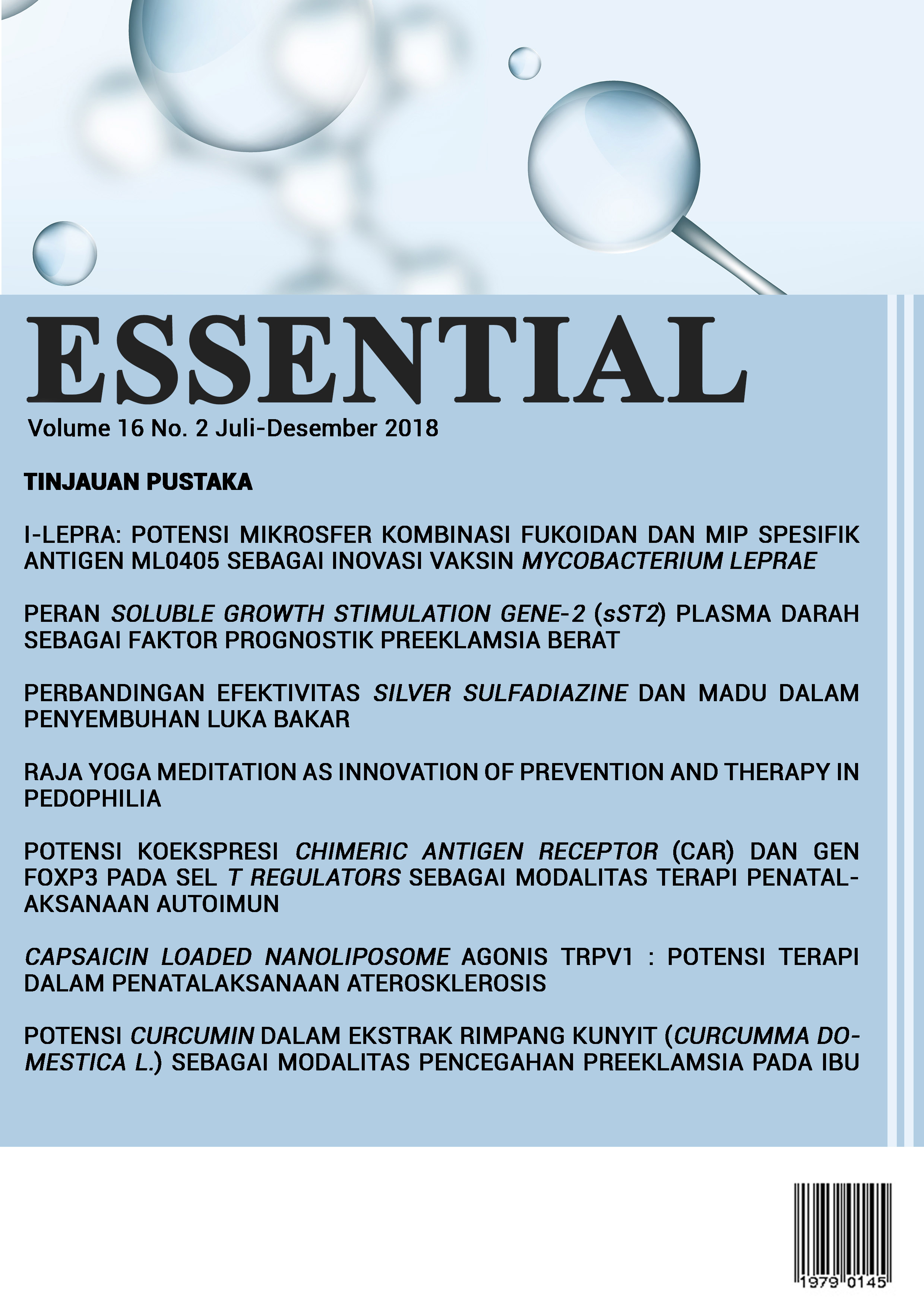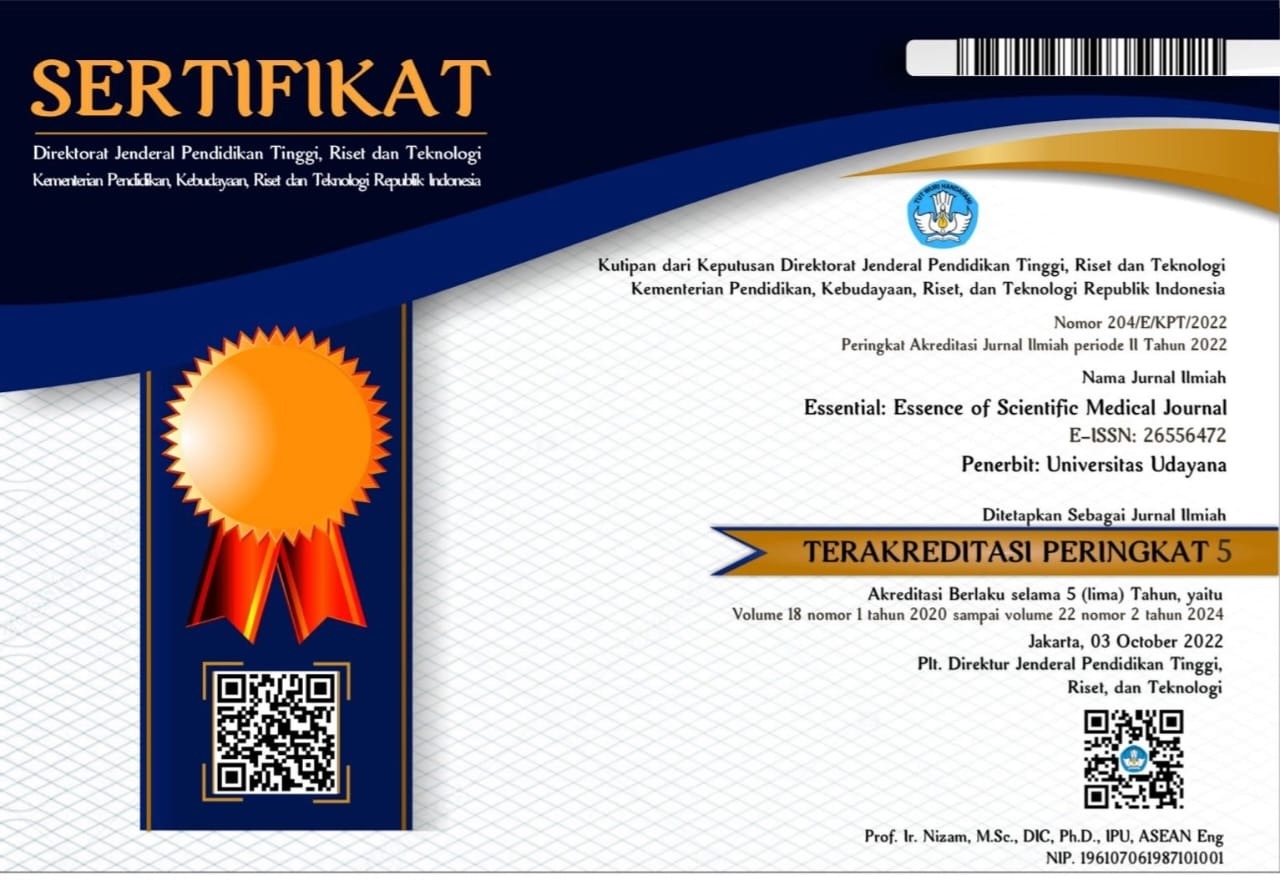PERAN SOLUBLE GROWTH STIMULATION GENE-2 (sST2) PLASMA DARAH SEBAGAI FAKTOR PROGNOSTIK PREEKLAMSIA BERAT
Abstract
This article is aimed to know the role of soluble growth stimulation gene-2 (sST2) as a prognostic factor in patients with severe preeclamsia. A search was conducted on Pubmed, GoogleScholar and ScienceDirect based on selected clinical question. The articles selection was based on inclution and exclution criteria. Three articles were critically appraised for its validity, importance and applicability. All three choosen articles state that higher sST2 plasma is correlated with overall survival patients with severe preeclamsia. SST2 level may serve as a prognostic factor regarding overall survival in patients with severe preeclamsia.
Downloads
References
2. Koual M, Abbou H, Carbonnel M, Picone O, Jean-Marc Ayoubi. Short-term outcome of patients with preeclampsia. Vascular Health and Risk Management. 2013; 9: 143–148.
3. World Health Organization Fact Sheet, Maternal mortality, May 2014.
4. Birawa AD, Hadisaputra H, Hadujono S. Kadar D-dimer pada ibu hamil dengan preeklampsia berat dan normotensi di RSUP Dr. Kariadi. Majalah obstetri dan ginekologi Indonesia, PT Bina Pustaka Sarwono Prawirohardjo, 2009; vol 33: 2.
5. Survey Demografi dan Kesehatan Indonesia (SDKI) 2012 Jakarta.
6. Redman CW, Sargent IL. Immunology of preeclampsia. Am J Reprod Immunol 2010;63:534-43.Mor G, Cardenas I, Abrahams V, Guller S. Inflammation and pregnancy: the role of the immune system at the implantation site. Ann N Y Acad Sci 2011;1221(1):80-87.
7. Redman CW. Preeclampsia: A multi-stress disorder. La Revue de medicine interne 2011;32S:S41-S44.
8. Burton GJ, Jauniaux E. Placental oxidative stress: from miscarriage to preeclampsia. J Soc Gynecol Investig 2004;11:342-352.
9. Poon LC, Kametas NA, Maiz N, Akolekar R, Nicolaides KH. First trimester prediction of hypertensive disorders in pregnancy. Hypertension 2009;53:812-8.
10. Raghupathy R. Cytokines as Key Players in the Pathophysiology of Preeclampsia. Med Princ Pract 2013;22(suppl 1):8–19.
11. Lamarca BD, Ryan MJ, Gilbert JS, et al. Inflammatory cytokines in the pathophysiology of hypertension during pre-eclampsia. Curr Hypertens Rep 2007;9:480–485.
12. Saito S, Nakashima A, Shima T, Ito M. Th1/Th2/Th17 and Regulatory T-Cell Paradigm in Pregnancy. American Journal of Reproductive Immunology 2010;63:601–610.
13. Servitje EL. A leading role for the immune system in the pathophysiology of preeclampsia. Journal of Leukocyte Biology 2013;94:247-257.
14. Mutter WP, Karumanchi SA. Molecular mechanisms of preeclampsia. Microvascular Research 2008;75:1-8
15. Stampalija T, Chaiworapongsa T, Romero R, Chaemsaithong P, Korzeniewski SJ et al. Maternal plasma concentrations of sST2 and angiogenic/anti-angiogenic factors in preeclampsia. J Maternal Fetal Neonatal Med. 2013; 26(14): 1359-1370.
16. Verlohren S, Stepan H, Dechend R. Angiogenic growth factors in the diagnosis and prediction of pre-eclampsia. Clin Sci (Lond) 2012;122:43–52.
17. Kusanovic JP, Romero R, Chaiworapongsa T, et al. A prospective cohort study of the value of maternal plasma concentrations of angiogenic and anti-angiogenic factors in early pregnancy and midtrimester in the identification of patients destined to develop preeclampsia. J Matern Fetal Neonatal Med 2009; 22: 1021–38.
18. Granne I, Southcombe JH, Snider JV, et al. ST2 and IL-33 in pregnancy and pre-eclampsia. PLoS One 2011;6:e24463.
19. Kakkar R, Lee RT. The IL-33/ST2 pathway: therapeutic target and novel biomarker. Nat Rev Drug Discov 2008; 7(10): 827-840.
20. Trajkovic V, Sweet MJ, Xu D. T1/ST2 – an IL-1 receptor-like modulator of immune responses. Cytokine Growth Factor Rev 2004; 15: 87-95.
21. Miller AM. Role of IL-33 in inflammation and disease. Journal of inflammation 2011; 8(1): 22.
22. Laksmi M. Soluble Growth Stimulation Gene-2 Level in Severe Preeclamsia Patients without and with Complications. JSFAOG.2018.


 SUBMISSION
SUBMISSION
















